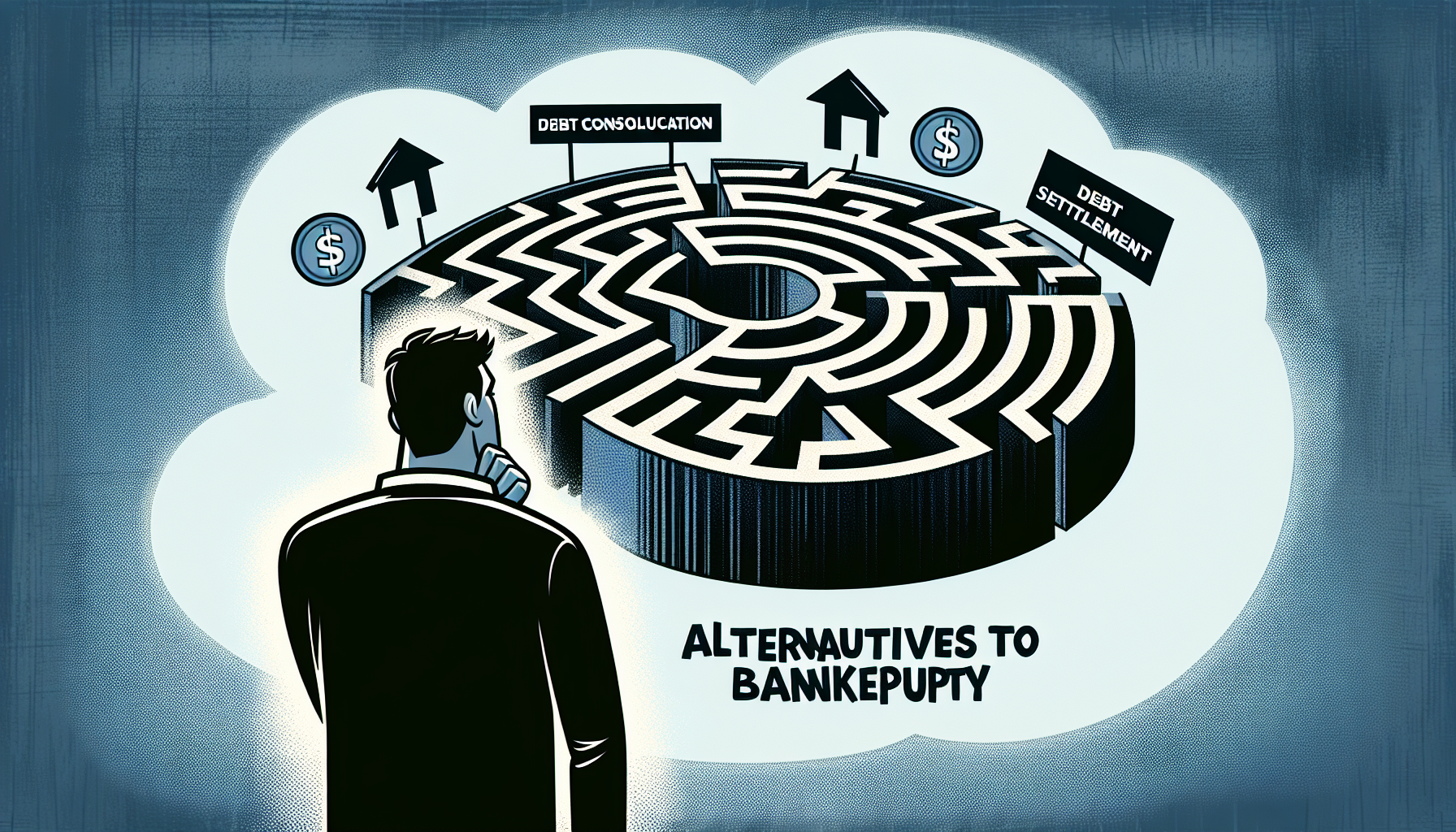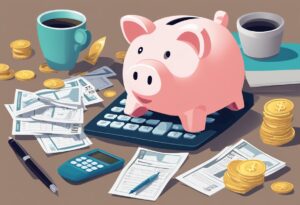
- Insurance
-
-
Most Popular
-
-
- Investing
-
-
Most Popular
-
Best Of
-
-
- Banking
-
-
Best of
-
Banking Reviews
-
Explore More
-
-
-
- Loans
-
-
Most Popular
-
Explore more
-
-
- Credit Cards
- Reviews
- Making Money
Assessing Your Finances: How Much Debt Is Worth Filing Bankruptcy?
How much debt justifies bankruptcy? There’s no one-size-fits-all answer, but understanding “how much debt is worth filing bankruptcy” for your situation is crucial. This article aims to clarify that threshold by examining the realistic costs of bankruptcy, how your income affects the decision, and the varying impacts on different types of debt, ultimately providing you with a framework to assess if bankruptcy is a viable path for you.
Written by:
Key Takeaways
- Bankruptcy can provide relief from overwhelming debt, but it includes costs like attorney fees, filing fees, and mandatory credit counseling, which must be weighed against the benefits.
- Understanding the difference between secured and unsecured debts is crucial, with bankruptcy often discharging unsecured debts like credit card and medical bills, while secured debts may involve the repossession of assets.
- Alternatives to bankruptcy should be explored first, such as debt consolidation, management programs, or credit counseling, which may offer a way to manage debt without the long-term impact on credit that bankruptcy incurs.
Table of Contents
Evaluating Your Debt Load: Is It Enough to Consider Bankruptcy?
Have you ever felt like you’re sinking under the weight of your financial obligations, gasping for air as each bill pulls you deeper? You’re not alone. Many grapple with the decision to file bankruptcy, but it’s the understanding of whether your debt load truly necessitates such a drastic step that can be a lifeline. The bankruptcy court scrutinizes your capacity to repay your debts, considering all facets of your financial life.
If garnished wages, insurmountable credit card debt or medical bills are causing distress, bankruptcy could be a viable option. Be aware, however, that initiating the bankruptcy filing process may exacerbate your financial strain due to additional costs such as attorney fees and credit counseling course expenses. It’s about measuring the depth of your debt against the cost and benefits of declaring bankruptcy.
When Does Debt Become Overwhelming?
The signs of overwhelming debt are not always as clear as an overdrawn bank account. They are insidious, creeping up until the day you realize that making minimum payments on your debts has become a distant dream. You may find yourself dodging phone calls from debt collectors or losing sleep over the threat of lawsuits and wage garnishments. These are the harbingers of financial distress, signaling that your financial obligations have spiraled beyond your control and you might be wondering how much debt you have accumulated.
Bankruptcy may appear as a beacon of hope when your debt is so overwhelming that even consolidation feels like a temporary fix. It offers a way to halt further financial damage and commence the healing process.
The Role of Income in Your Decision
When considering personal bankruptcy, your income is not just a number on a paycheck; it’s the cornerstone of your eligibility for Chapter 7 bankruptcy. The means test, a gatekeeper to debt relief, compares your earnings to the state median and scrutinizes your disposable income to determine if you’re genuinely in need of relief. Should your income be relatively meager, you could pass this test with ease, paving the way towards a fresh financial start.
Bankruptcy could appear as a solution should your consumer debt surpass half of your income or if repayment seems like a quest that could exceed five years.
Thresholds for Bankruptcy: No Minimum, But Practical Considerations
You might be surprised by the answer to the question “How much debt is it worth to declare bankruptcy?”. Curiously enough, the law does not demand a minimum debt for bankruptcy. The decision to file is not about hitting a specific number but assessing if bankruptcy is worth the effort in your individual case. It’s a practical consideration, like choosing the right-sized lifeboat; you wouldn’t want one too big for your needs or so small that it capsizes under the weight of your debts.
The costs of filing for Chapter 7 bankruptcy include:
- The $338 filing fee
- Attorney fees (which can range from $1,000 to $3,500)
- Credit counseling and debtor education courses (which can cost around $50 to $100 each)
It’s important to weigh the potential relief against these financial costs and consider your personal circumstances before deciding to file for bankruptcy. Bankruptcy should not be a reflex action to financial stress but a calculated move after considering all your debts and life circumstances.
Deciphering Between Secured and Unsecured Debt
Not all debts are equal. Failure to pay secured debt, which is tied to collateral such as your car or house, could lead to repossession of these assets. Personal loans, on the other hand, are unsecured debts. Think of these as the anchors that can drag you down if not handled carefully.
On the flip side, unsecured debts, such as credit card debt and medical bills, are like the waves that can be navigated without the risk of losing tangible assets. When filing for bankruptcy, unsecured debts are often considered dischargeable debt, providing a lifeboat that allows you to leave behind the burden of so much debt. However, if you’re sentimentally or practically attached to items secured by debt, you’ll need to strategize to keep them afloat.
Bankruptcy Types and Their Suitability Based on Your Debt
Choosing the right type of bankruptcy is akin to selecting the best escape route when your financial house is on fire. Chapter 7 bankruptcy, often referred to as a liquidation bankruptcy, might be your best bet if your income is below the state’s median and you’re drowning in a sea of unsecured debts. Within about three months, you could be liberated from the shackles of these financial obligations, giving you a chance to swim to the surface and breathe again.
However, if you have a steady income and wish to hold onto your prized possessions, Chapter 13 bankruptcy offers a structured repayment plan over 3 to 5 years, allowing you to manage both secured and unsecured debts. The fees for these bankruptcies, though a drop in the ocean compared to the debt they address, are part of the equation, with Chapter 7 costing $338 and Chapter 13 a bit less at $313.
Alternatives to Filing for Bankruptcy

Before you take the plunge into the depths of bankruptcy, it’s worth exploring the shoreline for other paths to financial stability. Debt consolidation can be a beacon of hope, merging multiple debts into a single, more manageable payment with a lower interest rate. It’s a strategy that can keep you afloat without the need to file for bankruptcy.
When your monthly obligations are mostly non-dischargeable, like certain tax debts or child support, alternatives such as debt management programs can offer a life vest to keep you from sinking. These programs, often facilitated by credit counseling agencies, can help you navigate the stormy seas of debt without setting foot in a bankruptcy court.
Keep in mind that reassessing your budget and lifestyle to allocate additional funds, or taking on extra work, might provide the necessary financial boost to stay afloat.
Credit Counseling: A Mandatory Step
Prior to declaring bankruptcy, you’re required to undergo credit counseling. This mandatory step, often provided by a credit counseling agency, can shine a light on the murky waters of your personal finance, offering guidance on managing your debts and exploring all available debt relief options. While there’s a fee, typically around $25 to $50, it shouldn’t deter you; it can often be waived for those who can’t afford it. Think of credit counseling as your compass in the storm, guiding you towards financial stability, whether that means filing for bankruptcy or finding a more suitable repayment plan.
The certificate you receive upon completing this course is your ticket to proceed with a bankruptcy filing, should you choose to do so within six months.
Exploring Debt Settlement and Management Plans
Debt settlement could be the life raft you need, allowing you to pay less than what you owe and still satisfy your creditors. It’s a direct negotiation with the waves of debt, often leading to expedited relief, although it may leave a temporary mark on your credit report.
If you’re looking for a more structured approach, a debt management plan can be the steady ship you need to navigate through your debt, offering benefits like lower interest rates and manageable monthly payments. These plans, which can be part of the guidance you receive from credit counseling, could set you on a course that avoids the storm of bankruptcy altogether.
The Consequences of Declaring Bankruptcy
Sailing into the sunset with bankruptcy might seem appealing, but it’s not without its storms. Your credit score will take a hit, plunging into the murky depths and remaining on your credit report for up to a decade with Chapter 7, or seven years with Chapter 13. It’s like a beacon warning future lenders of past financial distress, making it harder to obtain credit and potentially affecting your ability to navigate future financial endeavors.
The public nature of bankruptcy means that your financial struggles are on display, which could lead to scrutiny or judgment from potential employers or creditors. And with attorney and filing fees draining $300-$340 from your wallet, the cost of bankruptcy is an immediate whirlpool to navigate.
Preparing for Bankruptcy: Steps to Take
If you decide that filing bankruptcy is your only lifeline, you’ll need to prepare meticulously. A bankruptcy lawyer can provide a map to navigate the complex waters of bankruptcy laws and offer free consultations to assess your financial situation. Gather all your documents – pay stubs, bank statements, tax returns, and more – like a captain collects his charts before setting sail.
Filling out the necessary forms and attending the meeting of creditors are integral steps in this process. Don’t forget to complete your credit counseling, ensuring you have the necessary certificate of completion in hand before you begin your journey. Lastly, address any secured debts like your car loan, deciding whether to surrender, reaffirm, or redeem your vehicle, as if deciding which belongings to take on a lifeboat
Legal and Financial Advice: Seeking Professional Help
Navigating the complexities of bankruptcy is no solo voyage. Seasoned bankruptcy attorneys are like experienced captains, offering guidance on the right type of bankruptcy to file and steering you through the stormy seas of bankruptcy laws. Financial advisors specialize in charting a course through debt, helping you explore alternatives to bankruptcy that could be your saving grace.
When considering the tumultuous journey of filing for bankruptcy, it’s important to evaluate your ability to repay debts, the types of debts you’re facing, and your overall financial situation. Remember, seeking professional advice is not a sign of weakness but a strategic move to ensure you’re making the best decisions for your future.
Summary
As we dock at the end of our journey, it’s clear that while bankruptcy may be a daunting prospect, it can also be a strategic move to regain control of your financial situation. We’ve navigated through assessing debt loads, understanding the types of debts, and considering income’s role in the decision-making process. We’ve explored the depths of bankruptcy types and the alternatives that could steer you away from filing. When thinking about how much debt it is worth to declare bankruptcy; it’s essential to weigh the consequences. Prepare meticulously, and seek the guidance of professionals to chart the best course forward. May you find the courage to set sail toward a more stable financial horizon, knowing that sometimes, declaring bankruptcy is not an act of surrender but a bold move toward a brighter future.
Quick Questions
Consider filing for bankruptcy if you’re struggling to make minimum payments, facing lawsuits or wage garnishments, and feeling overwhelmed by financial stress.
No, there is no specific minimum amount of debt required to file for bankruptcy. The decision is based on individual circumstances and the ability to manage the debt load.
The type of debt you have can affect your bankruptcy filing; secured debts may result in the loss of assets, while unsecured debts like credit card debt can often be discharged.
Consider debt consolidation, debt management plans, and debt settlement as alternatives to filing for bankruptcy. Credit counseling can also help explore all available debt relief options.
Declaring bankruptcy can have long-term consequences such as a decreased credit score, lasting on your credit report for up to 10 years, and impacting future credit opportunities.

Join the MoneyMash community!
Sign up to get the latest personal finance news.
© 2025 MoneyMash an Element Road, LLC Company.
MoneyMash is an independent, advertiser-supported site. We may receive compensation when you click to apply for some products using the links that you find on our website. Opinions presented on our website are those of MoneyMash or our team of writers and reviewers who post their own opinions. For more information, please read the full disclosure.
